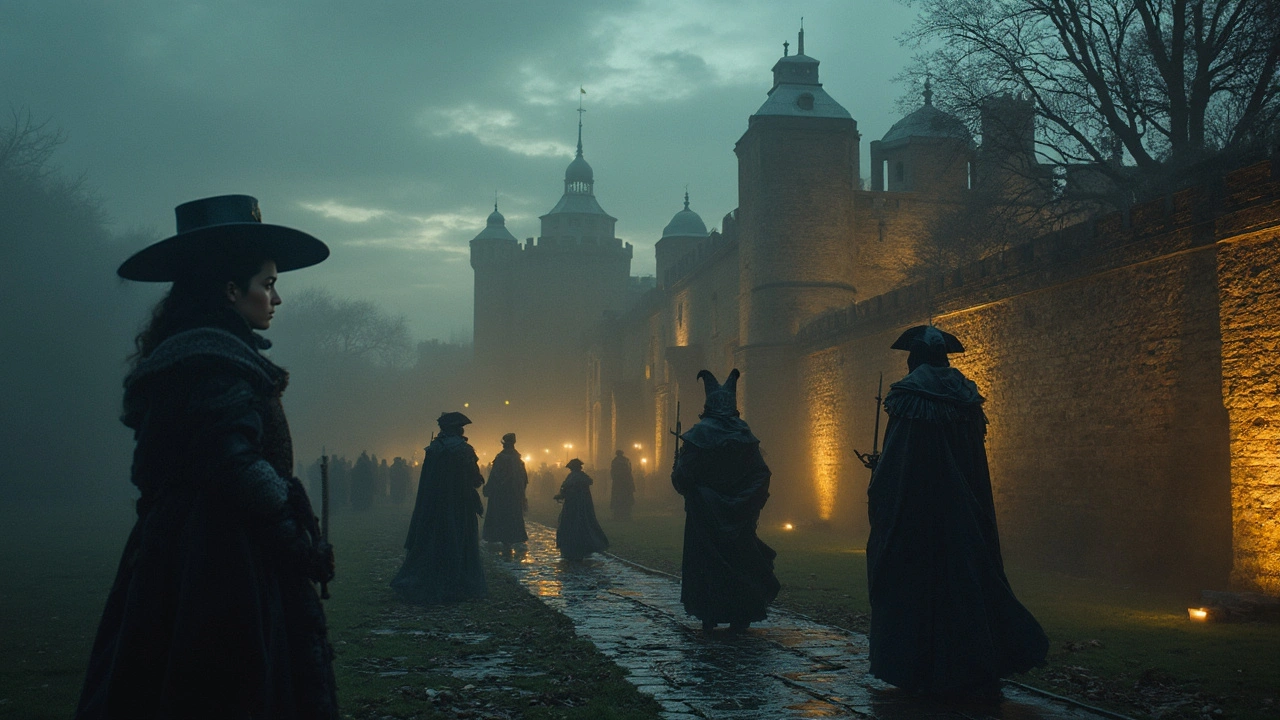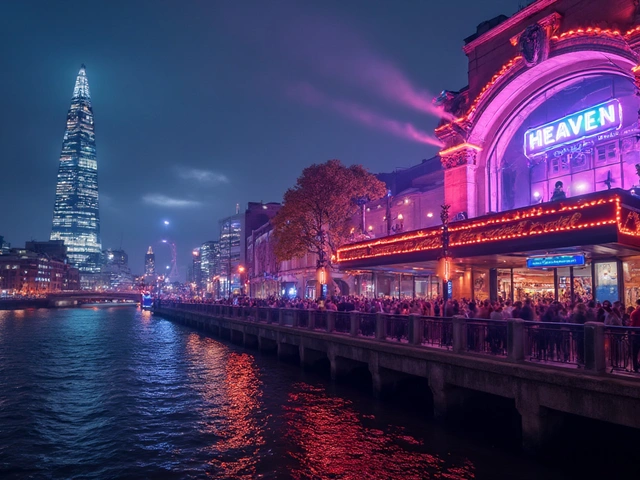If you live in London, you can’t really avoid the looming presence of the Tower of London. Sitting right on the banks of the Thames, it’s hard to miss this hulking fortress with its thick stone walls and mysterious air. But the Tower isn’t just another old building—it's a key piece of London’s past, from royal plots to daring escapes.
For anyone wandering through the City or grabbing a pint at Cooper’s Row, the Tower is more than a backdrop. It’s where kings made laws, enemies vanished, and the phrase "sent to the Tower" actually meant real danger. Even if you’ve only walked past it on the way to Tower Gateway or scoffed one too many Pret sandwiches in sight of its walls, there’s loads you might not know lurking within those battlements.
If you’re planning to pop in, timing matters. The queues can get as thick as the White Tower’s ancient doors, especially during half-term or right before Christmas. Locals know weekdays—especially before 11am—are your best shot at dodging the tourist mobs. And don’t skip the Yeoman Warder tours (those guys in the fancy uniforms know more London gossip than anyone I’ve ever met).
- The Tower’s Wild Past: Blood, Betrayal, and Crowns
- Life Inside the Fortress: From Ravens to Royals
- Hidden Corners and Local Legends
- Smart Ways to Experience the Tower Today
The Tower’s Wild Past: Blood, Betrayal, and Crowns
The Tower of London holds more than just tourists and brave ravens. Built by William the Conqueror in 1078, it was part-fortress, part-palace, and—when things got grim—England’s most notorious prison. If walls could talk, you’d hear more about family drama and dodgy deals than on a Saturday night in Soho.
Let’s start with the basics: this wasn’t just a castle to show off. The Tower was where the big decisions happened, like locking up queens, princes, and pretty much anyone who annoyed the king. It’s famously where Anne Boleyn, Henry VIII’s second wife, spent her last days before her execution in 1536. She wasn’t alone either; Lady Jane Grey, “the Nine Days’ Queen,” was also beheaded here. The Tudors really knew how to bring down the house.
| Famous Tower Prisoners | Reason for Imprisonment |
|---|---|
| Anne Boleyn | Treason charges |
| Guy Fawkes | Gunpowder Plot |
| Rudolf Hess | WWII propaganda |
| Elizabeth I | Suspicion of treason (before becoming queen) |
But it wasn’t all heads on the block. The Tower protected the royal history every Londoner’s heard whispers about. During the Wars of the Roses, princes simply disappeared in the night—shady business that still fuels pub debates across the city. The Tower was the official spot to stash the Crown Jewels too, which was convenient given the odd attempt at theft (and yes, there really was a plot to nick them in 1671; Thomas Blood almost got them out under his cloak!).
Even today, walking past Traitor’s Gate by the Thames gives Londoners a chill. That’s where prisoners were rowed in from Southwark or Westminster, knowing their fate was already on someone else’s agenda. If you want a proper sense of what power struggles looked like in the heart of London, this is still the city’s best stage for history’s greatest dramas.
Life Inside the Fortress: From Ravens to Royals
Ask any Londoner about the Tower of London, and the first thing they’ll probably mention is the ravens. These black birds are more than just Instagram material—they’re part of the fortress’s legend. There’s a local saying that if the ravens ever leave, the kingdom will fall. So there’s always at least six, and honestly, they look like they run the place. The Ravenmaster actually feeds them raw meat from Smithfield Market and even biscuits dipped in blood. It’s as grisly as it sounds.
But life in the Tower wasn’t always about birds. For centuries, real royals and their guards called these stone walls home. Back in the day, it was more fortress than palace—and if you roll your eyes at tourist audio guides, this is the exception. The rooms still echo with stories: Anne Boleyn’s ghost (headless, if you believe the chatter) is supposedly spotted near the Chapel Royal. Guy Fawkes got grilled right here after the failed Gunpowder Plot. The Tower once even had its own menagerie—lions, tigers, and a polar bear that fished in the Thames in the 1200s. Imagine that, instead of today’s tame corgis hiking around Hyde Park.
The Yeoman Warders, better known to Londoners as Beefeaters, are more than just a selfie opportunity. These folks live on site with their families, in flats right within the Tower grounds. It’s the only spot in central London where you can say your next-door neighbour is a centuries-old fortress. You might spot them doing the Ceremony of the Keys most evenings—a 700-year-old ritual where the main gates are locked for the night. Only a few locals get the invite; tickets are free but must be booked months ahead.
If you’re hoping to catch all this, here’s the stuff people miss:
- The Crown Jewels are still here, under guard by armed soldiers. You can queue for ages during summer holidays, so weekdays late afternoon are way quieter.
- There’s a working chapel, and Tower residents actually worship there—St Peter ad Vincula is where Queen Anne Boleyn and Lady Jane Grey are buried.
- Don’t forget the famous graffiti scratched into the Beauchamp Tower’s stone, put there by prisoners awaiting their fate. Spotting a carved Tudor rose is like finding a bit of secret history.
| Who Lives/Works In The Tower? | Number |
|---|---|
| Ravens | At least 6 |
| Yeoman Warders (Beefeaters) | Over 30 |
| Ceremony Participants (per night) | Few dozen |
| Tourists (avg. per year) | ~3 million |
The Tower of London isn’t just a museum; it’s a living, breathing slice of city life. It mixes royal tradition, local legends, and a healthy dose of British weirdness, right in the heart of London.

Hidden Corners and Local Legends
Even Londoners who pass the Tower of London weekly often miss the juiciest stories tucked away behind the main crowds. For starters, slip away from the herds and check out the Bloody Tower, which sits quietly on the river side. Legend has it the two young princes—Edward V and his brother Richard—were murdered here in the 15th century. No one found their bodies for centuries, until bones appeared beneath a staircase. Crime drama, Tudor-style.
Elsewhere, there’s the Salt Tower, which used to house political prisoners. Carved into its walls, you’ll spot graffiti from the likes of John Gerard, a Jesuit priest who managed a daring escape across the Thames. He supposedly bribed a guard with oranges, proving that London’s love of quirky escapes goes back centuries.
Don’t forget the ravens. They aren’t just for show—legend says if the ravens ever leave, the UK (and the monarchy) will fall. Each raven even has a name: Jubilee, Harris, Poppy, and the gang. The current Ravenmaster, Chris Skaife, told the BBC,
"They’re not just birds, they’re household cavalry in feathers—they know how many visitors eye them up every day."
If you want to see a lesser-known part of the London attraction, find the Traitors’ Gate on the riverside. It’s where Anne Boleyn and others took their last boat trip from Westminster. It’s oddly easy to overlook, even though plenty of school groups have paused there for a quick sandwich (and probably a shiver).
Locals and history buffs alike swear by these lesser-trodden spots. There’s loads packed inside the walls, so it’s wise to wander off the regular route. You might just end up stumbling into the next big legend in line.
Smart Ways to Experience the Tower Today
When it comes to visiting the Tower of London, you want to make the most of it. Tickets aren’t cheap—and honestly, there’s a knack to getting the best out of this London attraction even if you’re a local and not just tagging along with family from out of town.
First, grab tickets online through the official Historic Royal Palaces site. It’s not only quicker, but you’ll also save a few quid over buying at the gate. And if you’re a Londoner or plan to go back, consider a membership, which covers the Tower plus Hampton Court, Kensington Palace, and more. That’s a big win if you’re up for more royal history weekends.
The early bird really does get the crown jewels here—literally. Head straight to the Jewel House right when the doors open. The famous Crown Jewels queue swells fast, especially during summer and school holidays. Most folks don’t know that later in the afternoon, queues thin out again, but the lighting can get crowded, so morning is still your best bet.
The Yeoman Warder (Beefeater) tours are a highlight for any visit. They start every 30 minutes near the entrance, and you get the sort of stories you won't find on Wikipedia. Want to go at your own pace? The free audio guide is available in multiple languages, and you can nab it on your phone if you forgot your headphones.
- Don't miss the ravens. Legend says the kingdom falls if they leave, and you'll spot them strutting about the South Lawn.
- If you love weird history, pop by the torture exhibit, but brace yourself—it's as grim as London’s old dungeons.
- Hungry? Skip the pricey Tower cafés and walk a few minutes to St. Katharine Docks for better food and less crowds.
- Kids with you? There are usually special family trails and hands-on activities announced on the official site—worth checking in advance.
- If you live in greater London or travel by train often, look for 2-for-1 offers on National Rail’s Days Out Guide (just remember you’ll need a physical ticket, not just an Oyster).
| Best Times to Visit | Typical Queue Time |
|---|---|
| Weekday mornings (before 11am) | Short (10-20 min) |
| Midday weekends | Very Long (60+ min) |
| Late afternoon (after 3pm) | Moderate (20-40 min) |
If you’re after a really unique angle, look out for their twilight tours or Theatre at the Tower nights, which serve up the grisly tales with a side of drama (keep an eye on their events calendar—you won’t see these on every visit). And on Remembrance Day, the Tower is central to London’s memorial ceremonies—pretty moving if you’re around in November.
Bonus: Annual London heritage events, like Open House London, often open up spots in the Tower that are off-limits the rest of the year. Locals, keep these dates circled—they don’t come around often!





